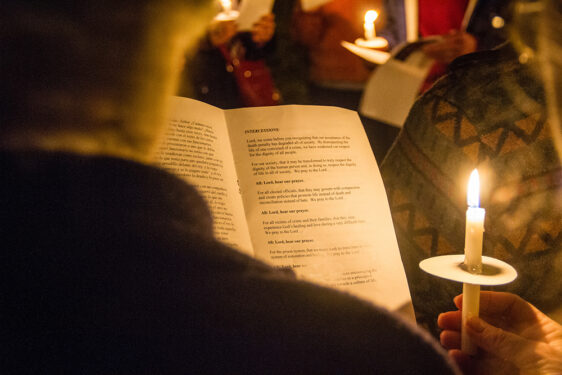
‘Enough. Stop These Executions’ Says USCCB Statement
WINDSOR TERRACE — During the week in which two people were scheduled to die by lethal injection, the U.S. Conference of Catholic Bishops (USCCB) implored President Donald Trump and Attorney General William Barr to halt all federal executions.
A portion of the Sept. 22 statement reads, “After the first murder recorded in the Bible, God did not end Cain’s life, but rather preserved it, warning others not to kill Cain (Gn. 4:15). As the Church, we must give concrete help to victims of violence, and we must encourage the rehabilitation and restoration of those who commit violence. Accountability and legitimate punishment are a part of this process. Responsibility for harm is necessary if healing is to occur and can be instrumental in protecting society, but executions are completely unnecessary and unacceptable, as Popes St. John Paul II, Benedict XVI, and Francis have all articulated. …
“We say to President Trump and Attorney General Barr: Enough. Stop these executions.”
.@ArchbishopOKC and Archbishop Joseph F. Naumann have issued the following statement in response to the federal executions scheduled this week: https://t.co/ATOzTl0zFh. pic.twitter.com/48ug3xI1M5
— U.S. Conference of Catholic Bishops (@USCCB) September 22, 2020
The statement was signed by Archbishop Paul Coakley, chairman of the USCCB Committee on Domestic Justice, and Archbishop Joseph Naumann, chairman of the USCCB Pro-Life Committee. It highlighted Pope Francis’ 2018 update on the Catholic Church’s Catechism which included the statement that “the death penalty is inadmissible because it is an attack on the inviolability and dignity of the person.”
Former U.S. soldier, William LeCroy, 50, was executed Sept. 22 by lethal injection, becoming the sixth federal inmate executed by lethal injection this year at the federal prison complex in Terre Haute, Indiana. Christopher Vialva was executed Sept. 24, also by lethal injection. He was the first black man to be executed since the federal government resumed federal executions this year. Vialva was convicted for his part in a 1999 carjacking and the killing of a husband and wife in Texas who were visiting youth ministers from Iowa. Vialva was 19 at the time.
He released a YouTube video Sept. 11 pleading for a stop to his execution citing an unfair appeal process in federal death penalty cases, racial disparities on death row and his young age at the time of crime.
He said he had committed a great wrong, and he was “not making this plea as an innocent man,” but as a “changed and redeemed man.”
“I’m not the stupid kid I was the day I made the most desperate and tragic decision of my life,” Vialva added.
In prison, Vialva became a Messianic Jew and in recent years has regularly ministered to fellow inmates, according to a report on WFIU public radio in Indiana.
LeCroy and Vialva were the sixth and seventh inmates to be executed this year, following the resumption of federal executions after a 17-year hiatus, according to the Federal Bureau of Prisons.
The Catholic Mobilizing Network led virtual prayer vigils before both executions. At the Sept. 22 virtual prayer service, a statement written by Atlanta Archbishop Gregory J. Hartmayer was read aloud to the 215 online participants.
It said: “A convict who is killed never has an opportunity to repent or seek reconciliation with those he or she may have hurt. We must always leave open the door for redemption and rehabilitation.”
The archbishop prayed for LeCroy’s victim, Joann Lee Tiesler, and for her family. He also prayed for LeCroy “because he is a child of God” whose life has worth and dignity.
In the Sept. 24 prayer vigil, a statement by Washington Archbishop William D. Gregory that was read aloud, prayed for Vialva, his victims and their families and also that the nation would end its use of capital punishment, which “only serves to make each of us complicit in a new act of violence.”
“Taking the life of another human being harms each one of us, defying the sanctity of human life and devaluing our worth as God’s own creation. The death penalty damages our culture and turns our government into a system of retribution, when it should be a system of support and service to its people,” Archbishop Gregory said.
Earlier in the year, on July 7, several U.S. bishops joined a statement of more than 1,000 faith leaders opposing the resumption of federal executions.
“As our country grapples with the COVID-19 pandemic, an economic crisis, and systemic racism in the criminal legal system, we should be focused on protecting and preserving life, not carrying out executions,” the faith leaders stated in July.
President Donald Trump has defended the use of the death penalty and claims that his support of the death penalty does not impact his pro-life credentials. Attorney General Barr was honored at the National Catholic Prayer Breakfast on Sept. 23.
The day before the national breakfast, the Santa Fe Archdiocese’s Office of Social Justice and Respect Life called on National Catholic Prayer Breakfast officials to withdraw its plans to honor U.S. Attorney General William Barr.
“We are appalled this group will honor Attorney General Barr in light of the fact he just recently began executions of federal prisoners; something that has not been done since 2003,” the news release of the Office of Social Justice and Respect Life said.
Editor’s Note: Catholic News Service contributed to this report.
[Related: Bishops Press for Death Penalty Protests Amid New Federal Executions]
